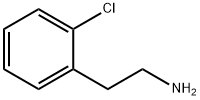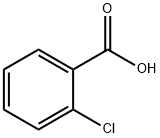A2322512
O-Chlorotoluene , Analysis of standard products, ≥99.8%(GC) , 95-49-8
Synonym(s):
1-chloro-2-methylbenzene
CAS NO.:95-49-8
Empirical Formula: C7H7Cl
Molecular Weight: 126.58
MDL number: MFCD00000562
EINECS: 202-424-3
Update time: 2022-07-08
PRODUCT Properties
| Melting point: | -36 °C (lit.) |
| Boiling point: | 157-159 °C (lit.) |
| Density | 1.083 g/mL at 25 °C (lit.) |
| vapor density | 4.38 (vs air) |
| vapor pressure | 10 mm Hg ( 43 °C) |
| refractive index | n |
| Flash point: | 117 °F |
| storage temp. | 0-6°C |
| solubility | H2O: slightly soluble0.047g/L at 20°C |
| form | Liquid |
| color | Clear |
| explosive limit | 1.0-12.6%(V) |
| Water Solubility | slightly soluble |
| Merck | 14,2171 |
| BRN | 1904175 |
| Dielectric constant | 4.4500000000000002 |
| Exposure limits | ACGIH: TWA 50 ppm NIOSH: TWA 50 ppm(250 mg/m3); STEL 75 ppm(375 mg/m3) |
| InChIKey | IBSQPLPBRSHTTG-UHFFFAOYSA-N |
| LogP | 3.42 at 25℃ |
| CAS DataBase Reference | 95-49-8(CAS DataBase Reference) |
| NIST Chemistry Reference | Benzene, 1-chloro-2-methyl-(95-49-8) |
| EPA Substance Registry System | o-Chlorotoluene (95-49-8) |
Description and Uses
2-Chlorotoluene can be mineralized completely by Rhodococcus, strain OCT 10 DSM 45596(T). It is used in the preparation of 3-chloro-4-methylcatechol and 4-chloro-3-methylcatechol. The oxidation of 2-chlorotoluene is very well catalyzed by the enzymes: toluene dioxygenase of P. putida F1 and chlorobenzene dioxygenase from Burkholderia, strain PS12.
Solvent; synthesis of dyes, pharmaceuticals, and synthetic rubber compounds
Safety
| Symbol(GHS) |     GHS02,GHS07,GHS08,GHS09 |
| Signal word | Warning |
| Hazard statements | H226-H332-H361d-H410 |
| Precautionary statements | P201-P202-P210-P273-P304+P340+P312-P308+P313 |
| Hazard Codes | Xn,N,F,Xi,T |
| Risk Statements | 20-51/53-39/23/24/25-23/24/25-11 |
| Safety Statements | 24/25-61-45-36/37-16-7 |
| OEB | A |
| OEL | TWA: 50 ppm (250 mg/m3), STEL: 75 ppm (375 mg/m3) |
| RIDADR | UN 2238 3/PG 3 |
| WGK Germany | 2 |
| RTECS | XS9000000 |
| Autoignition Temperature | 600°C |
| Hazard Note | Irritant/Flammable |
| TSCA | Yes |
| HazardClass | 3 |
| PackingGroup | III |
| HS Code | 29036990 |
| Hazardous Substances Data | 95-49-8(Hazardous Substances Data) |





